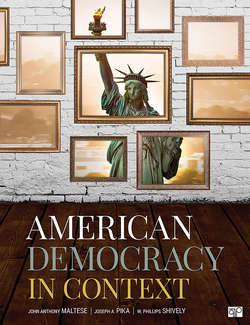Читать книгу American Democracy in Context - Joseph A. Pika - Страница 135
На сайте Литреса книга снята с продажи.
What Did the Framers Mean by “Freedom of Speech”?
ОглавлениеIf the framers considered “no prior restraint” to be the principle behind freedom of the press, what principle did they have in mind for freedom of speech? It simply is not clear. When the First Amendment was ratified, Pennsylvania was the only state whose constitution specifically protected speech, but it did so by closely linking it to freedom of the press (other states, such as Massachusetts, protected only freedom of the press).36
The free speech clause of the First Amendment raises many questions. Does it guarantee more than prohibition against prior restraint? Is it limited to political speech? Did it simply mean that only states could regulate speech? The Supreme Court has consistently rejected the notion that freedom of speech is absolute. Still, the question remains: Where should courts draw the line? Is obscenity constitutionally protected? False advertising? Threats to overthrow the government? For that matter, is speech limited to verbal utterances and written words? Or are symbolic expression and other forms of nonverbal communication also protected? In short, even though the First Amendment language dealing with freedom of speech and of the press may, at first glance, seem clear-cut, it is anything but.
